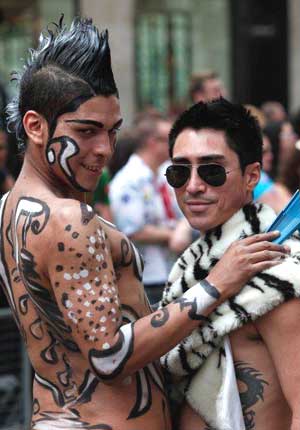Gay Pride has lots of sparkle, lots of pink plus a hint of grey
The annual event is now more a celebration than a campaign – and this year along came senior figures who fought the old battles

Your support helps us to tell the story
From reproductive rights to climate change to Big Tech, The Independent is on the ground when the story is developing. Whether it's investigating the financials of Elon Musk's pro-Trump PAC or producing our latest documentary, 'The A Word', which shines a light on the American women fighting for reproductive rights, we know how important it is to parse out the facts from the messaging.
At such a critical moment in US history, we need reporters on the ground. Your donation allows us to keep sending journalists to speak to both sides of the story.
The Independent is trusted by Americans across the entire political spectrum. And unlike many other quality news outlets, we choose not to lock Americans out of our reporting and analysis with paywalls. We believe quality journalism should be available to everyone, paid for by those who can afford it.
Your support makes all the difference.For Amy Ruffell, yesterday was about having fun. The 28-year-old – known as Raw Heidi – and team-mates from the roller derby outfit London Roller Girls took the annual gay gathering as an opportunity to don their – glittery pink – roller skates.
"Roller derby is a sport with a large LGBT [lesbian, gay, bisexual and transgender] contingency, but our group is made up of gay, bisexual and straight people," said Ms Ruffell, from Brixton, south London.
Organisers of the Gay Pride revels expected a million people to join yesterday's event under the theme Carnival of Love. Luigi Andreoli, a
28-year-old nurse from Ealing, west London, embraced the carnival spirit in fluorescent pink fishnet tights, feathers and a neon corset. "It took me about three hours to get ready," he said. "It's fantastic. This is what we are, and Pride is an excuse to show people that we enjoy who we are and there is nothing wrong with it."
The parade, led by the LGBT disability campaigner Kath Gillespie Sells in a white convertible Corvette, snaked from Portland Place in central London to Trafalgar Square. Cost-conscious civil servants – dressed as anything from a bright red lobster to the Lion King – recycled a two-year-old Home Office-sponsored Bedknobs and Broomsticks-themed float due to stretched resources.
Newcomers to the parade, Glug – the Gay, Lesbian Under Water Group – donned Speedos and underwater masks, while the Liberal Democrats' bus bore the message: "Delivering gay marriage! (Then we can divorce the Tories)". Representatives from the Army and Royal Navy were greeted with enthusiastic cheers as they marched to drumbeats in the afternoon sun.
The former England rugby union winger Ben Cohen said the murder of his father, Peter, who died trying to protect someone at a nightclub he owned in 2000, inspired him to join the parade. His death led the retired rugby star, a 32-year-old married father of twin girls who has a huge following among the gay community, to help raise awareness about homophobic bullying.
Gill Rimmer, 32, a transport planner from Camden, north London, who plays for lesbian football team London Lesbian Kickabouts, said the rise in homophobic attacks in the capital had increased the importance of events promoting the gay community.
"Living in London I don't feel persecuted on a daily basis, but I don't think my experience would be the same if I lived in other parts of the country," she said. "London Pride is not just for Londoners so it's important for people living outside London to be able to come here and celebrate with like-minded people."
As the skies clouded over in Trafalgar Square, the human rights campaigner Peter Tatchell, who had carried a placard satirising the BNP leader Nick Griffin in the parade, took to the stage. He criticised London politicians, including Mayor Boris Johnson, for failing to attend the event.
Then it was time to celebrate: families, gay couples, straight couples and groups of people old and young danced to live music.
There was little dancing at the first Gay Pride march in 1972, when gay and lesbian pioneers marched in an act of public solidarity and defiance. What started as a battle for equal rights has been almost overtaken by a celebration of the right to party.
Join our commenting forum
Join thought-provoking conversations, follow other Independent readers and see their replies
Comments